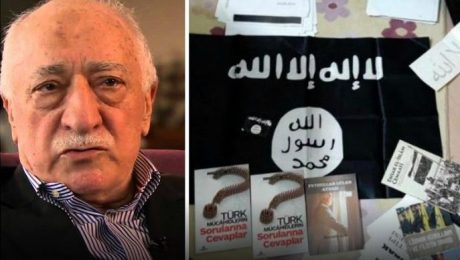Keyword: Defamation of Hizmet

Turkish police to plant Gülen’s books in ISIL cells, journalist claims
In the latest of an ever-growing demonization of Fethullah Gülen at the hands of Turkish government, police are set to deliberately put his books in ISIL cells in a bid to reveal an alleged connection between the cleric and the terrorist organization, according to a Turkish journalist.

Erdoğan to US: What verdict? What court for terrorists?
Turkish President Tayyip Erdoğan said during a reception before his departure from New York on Thursday that a court trial is not necessary for US-based Turkish Islamic scholar Fethullah Gülen, whose teachings have inspired the Gülen movement, designated a terrorist organization and accused of plotting a failed coup in Turkey on July 15.

Biden’s office refutes Turkish minister’s claim that US has proof Gülenists plotted coup
US Vice President Joe Biden’s office refuted a claim made by Bekir Bozdağ, justice minister of Turkey, who said on Thursday night that Biden had confirmed that substantive information on the involvement of US-based Turkish Islamic scholar Fethullah Gülen had been received by the US as part of an extradition request submitted by Ankara this month.

CHP leader says Erdoğan’s UN speech only served to promote Gülen movement
Republican People’s Party (CHP) leader Kemal Kılıçdaroğlu has criticized a speech delivered by Turkish President Recep Tayyip Erdoğan at a UN meeting on Tuesday in which he called on world leaders to take measures against the faith-based Gülen movement, saying that Erdoğan’s speech only served to promote the Gülen movement.

Turkey’s failed coup has spread to the classroom in EU states
What really annoyed the Dutch government, however, was when the Turkish consul general sent a letter to local authorities in the Netherlands advising them how to curb public protests opposing the government in Ankara. That brought a coldly dismissive response from foreign minister, Bert Koenders: “The Netherlands deals with Dutch society and that has nothing to do with the Turkish government.”

Crackdown on journalists leaves void in post-coup Turkey
That is down in large part to the gutting of Turkey’s independent press. More than 115 journalists have been imprisoned and hundreds more fired since the July 15th coup attempt, while 130 media outlets have been shuttered. That, in addition to the sacking of more than 1,000 media workers in the previous 12 months, has left crucial questions unanswered. Put simply, there is no one left – or willing – to overturn the stones on which the failed military takeover was built.

Fear Grows in Turkey as Crackdown on Gulen Followers Continues
The Turkish authorities are continuing their crackdown on followers of Islamic cleric Fethullah Gulen, who is being blamed for a failed military coup attempt. With tens of thousands of people arrested, opposition parties are starting to voice concern that the crackdown is turning into a witch hunt.

Liberal Turkish Journalists Champion Freedom of Expression, to a Degree
It’s precisely opposition journalists who have been criticized by colleagues who until recently worked for the newspapers of U.S.-based Fethullah Gulen. These colleagues accuse the opposition journalists of betraying freedom of expression. One of them is Sevgi Akarcesme who was editor-in-chief of the Turkish English-language daily Today’s Zaman. There is a great deal of truth in Akarcesme’s claims. But who today would dare defend journalists identified with Gulen?

72-year-old Turkish man detained over coup charges
Gülen movement has been accused of masterminding the coup attempt on July 15 despite its successive statements that denied any involvement. Failing to back up its accusations with credible evidence, the government has detained more than 40,000 people and arrested 24,000 over their alleged links to the coup attempt since July 15.

Erdogan at UN urges global action against preacher
Turkish President Recep Tayyip Erdogan on Tuesday demanded at UN speech international action against the US-exiled preacher Fethullah Gulen, whom he accuses of orchestrating an aborted coup d’etat against him. Gulen, who fled Turkey for Pennsylvania and has been active in religious dialogue and charity, strongly denies Erdogan’s charges that he organized the July military coup attempt, which quickly collapsed.






















